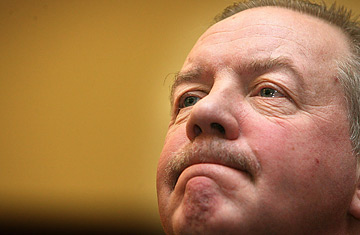
Raymond McCord, Sr., whose son Raymond McCord, Jr., was murdered by a Protestant paramilitary group, listens to the Police Ombudsman Nuala O'Loan's report into collusion, at a press conference at the Stormont Hotel, Belfast.
But it was only after his eldest son was murdered by one of the Protestant gangs that McCord proved how tough he really is — by taking on not only the killers, but also the police spymasters alleged to have shielded them from justice. McCord's decade-long odyssey that turned him from street fighter to amateur investigator was vindicated, Monday, when the official police ombudsman for Northern Ireland, Nuala O'Loan, alleged that officers of the Special Branch of Britain's Royal Ulster Constabulary had knowingly colluded with Protestant paramilitaries responsible for at least a dozen murders, shielding them from justice. Her report echoes McCord's allegations, on the basis of his investigation into his son's murder, that some police officers paid and protected terrorist killers, and allowed them to kill repeatedly. The misconduct of these officers, she wrote, could not have occurred "without the knowledge and support" of officers at "the highest levels" of the force.
Raymond McCord, Jr., was battered to death with a concrete block by members of the Ulster Volunteer Force in 1997. The 22-year-old had been caught transporting drugs allegedly belonging to a leader of the group, who, police believe, lost $100,000 as a result. It was the type of murder from which Northern Ireland would quickly turn away — there was a drugs link, and because it was Protestant-on-Protestant violence, it didn't threaten the fledgling peace process.
But even if it didn't have a wider political significance, the murder of McCord, Jr., cut the bottom out of his father's life. The hard man's instinct was for revenge, but McCord's ex-wife and his two surviving sons extracted a promise that he would stay within the law. Bound by that commitment, he used his head, channeling his rage into a determination to bring the killers to justice.
McCord spent years furrowing through Belfast's paramilitary underworld. "When I think of the people I met, some of the dodgy areas I went into, some of the clubs I went into?" he says. "But it's been worthwhile."
At first, he was puzzled by the fact that he seemed to find out more about his son's murder than the police had. Then he learned the reason: The UVF boss who allegedly ordered the killing was a police agent. Mark Haddock was a low-level informer when he first alleged to have killed in 1993 by shooting a Catholic woman while she cooked dinner for a sick Protestant friend. Despite having allegedly told police about the killing, he was kept on as an informer and his payments continued to increase.
By the time he is alleged to have had Raymond McCord, Jr., murdered, the report says, police had information pointing to Haddock as an accomplished killer, extortionist and drug dealer. In spite of a catalogue of suspected crimes, ordinary police officers were only able to jail him twice — once after he was caught red-handed attacking a bar, and more recently when one of his victims allegedly ignored death threats to testify against him. "He had a license to kill," says McCord. "And it wasn't some sort of romantic James Bond episode. The man is a vicious thug."
McCord told his findings to anyone who would listen. But apart from a handful of tabloid journalists, he says he wasn't taken seriously until 2002, when he met Nuala O'Loan. She had been appointed the Police Ombudsman for Northern Ireland as part of the reforms that followed the 1998 Good Friday settlement. A Catholic academic, Mrs. O'Loan's background is very different from McCord's. But she has proven to be equally tough-minded. Her report on a four-year investigation, published January 22, confirms McCord's basic conclusions. It alleges that some police informers in Northern Ireland got away with murder because of a policy that put control in the hands of the force's intelligence handlers rather than the cops who wanted to catch killers.
O'Loan's findings also make uncomfortable reading for the British government: A policy that was supposed to stifle terrorism seemed to wind up promoting it, and none of the U.K.'s institutional safeguards stopped it. "But for Raymond McCord walking through the door, none of this would have come out," says one of O'Loan's aides.
McCord may feel vindicated, but the Director of Public Prosecutions has concluded there isn't enough evidence to pursue charges. The British government is so far resisting calls for a public inquiry. Haddock — who is presently in prison for an assault that had occurred while he was still on the books as an informer, but which was only prosecuted after he had been taken off the books — hasn't commented. And McCord has paid a price for his efforts. There have been attempts on his life and he was forced to move out of North Belfast. He now lives behind bulletproof glass in another part of the city. "People who don't know me see this image of a tough guy who can stand up to these people," he says. "They don't see the man who sits at nights there in the chair and cries over his son." With his son's case coming to a close, McCord has his eye on plans to appoint an official champion for Northern Ireland's victims of violence. It will be a tough job, but he believes a hard man can do it.
